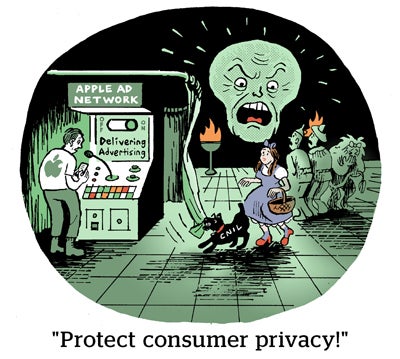Here’s today’s AdExchanger.com news round-up… Want it by email? Sign up here.
The Search Continues
Brave published a first-year recap of its search engine. It logged 2.5 billion queries and now claims a “level of quality” that competes with Google or Bing – though Brave is a blip in terms of market share.
People have thrown the kitchen sink at Google Search, but can it be stopped?
Market intel sources Stirista and StatCounter show a gradual decline of about 1% in Google’s search share in the past four years. So not much.
Neeva, a subscription search engine, launched with powerhouse players and funding, though it must convince users to pay for something that’s always been free.
DuckDuckGo lost share this year, Search Engine Roundtable reported this week. It’s plagued by PR fires due to its deal with Microsoft. (Bing is the DuckDuckGo search back-end.) Web researcher Zach Edwards showed DuckDuckGo stetting Microsoft and LinkedIn trackers when it claimed to remove all third parties and did remove all other tags.
Bing’s latest news is an expansion into shopping. But Microsoft seems content with a mid-single-digit share of the pie.
The dark horses are Apple and TikTok.
There were rumors of a Siri-based search engine debuting at Apple’s recent developer conference. That didn’t materialize, but iSearch is in the offing.
TikTok isn’t on search radars like Amazon or Bing is, but in terms of having millions of people actually enter queries into a command box, it’s a serious player.
Apple’s Bite
“It’s striking in retrospect how little time Apple spent publicly discussing its AppTrackingTransparency initiative,” writes Ben Thompson at Stratechery. “A mere 20 seconds at WWDC 2020, wedged in between updates about camera-in-use indicators and privacy labels in the App Store.”
Two years later, the entire mobile economy is still reeling.
The article is worth reading in whole – it’s a doozy and explores the nitty-gritty details of Apple’s policy terms. But Thompson sums it himself.
“Here’s the key point: when it comes to digital advertising, particularly for the games that make up the vast majority of the app advertising industry, transaction data is all that matters,” he writes. “All of the data that any platform collects, whether that be Meta, Snap, Google, etc. is insignificant compared to whether or not a specific ad led to a specific purchase, not just in direct response to said ad, but also over the lifetime of the consumer’s usage of said app.”
That payment attribution is mostly gone for Meta now. And a potential Apple app ad network would slide right into the value prop formerly occupied by Facebook.
Streaming Through The Downturn
It’s no secret that ad-supported streaming services are tripping the heels of subscription-based models. SVOD revenue this year is expected to dip 6% this year, as viewers shift to cheaper ad-supported tiers, Variety reports.
But the underlying reason may have more to do with good ol’ market maturation than stingy consumers.
“There’s maturity in how these services are being treated,” Liska Schmitz, managing director at Boston Consulting Group, told Morning Brew. “You’re not just looking at growth – you’re looking at profitability.”
Growth valuations are great for startups. But in a saturated market like CTV, investors want companies to trim costs and add revenue streams (like advertising). The looming threat of a recession only increases the pressure on profit margins.
Streaming companies are exploring their options to reduce costs and boost profits aside from ads. Going in this direction, unfortunately, means layoffs and fewer creative projects.
Streaming players like original content because they fully control all the inventory. But production costs and tougher viability thresholds will mean more money goes to low-risk franchise shows.
Netflix, for one, is trying all three tricks. In addition to planning an ad-supported tier, Netflix is paring back its headcount and its production lineup.
But Wait, There’s More!
Australian mobile game developer Lumi Interactive raises $6.75 million. [Gamesindustry.biz]
WPP and Ukraine unite on a campaign that markets the country as open for business. [Campaign]
Twitter introduces a new social shopping integration with Shopify. [blog]
At Cannes, marketers swear they’re interested in the metaverse. [Digiday]
You’re Hired!
Data monetization platform ArcSpan brings on Kelly Merton as VP of sales. [release]
CTV platform Sabio hires its first chief revenue officer, Tim Russell. [release]
First-party data platform FullThrottle hires five ad tech vets to help boost cookieless solutions. [release]













